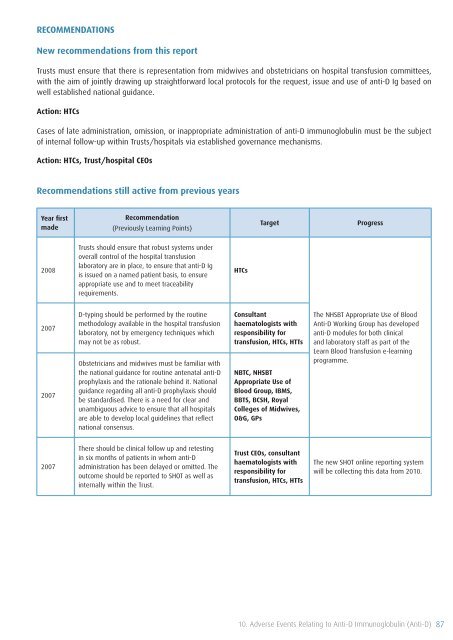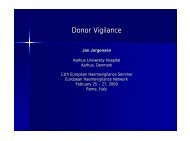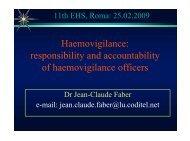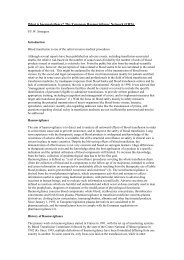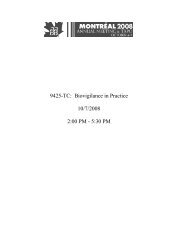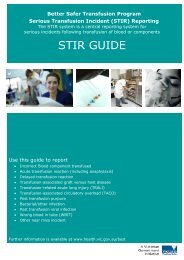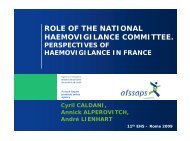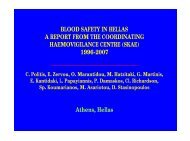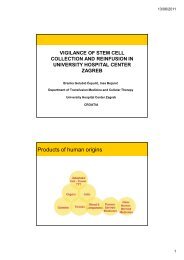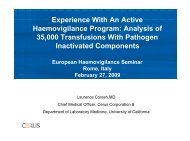SHOT Annual Report 2009 - Serious Hazards of Transfusion
SHOT Annual Report 2009 - Serious Hazards of Transfusion
SHOT Annual Report 2009 - Serious Hazards of Transfusion
You also want an ePaper? Increase the reach of your titles
YUMPU automatically turns print PDFs into web optimized ePapers that Google loves.
RECOMMENDATIONS<br />
New recommendations from this report<br />
Trusts must ensure that there is representation from midwives and obstetricians on hospital transfusion committees,<br />
with the aim <strong>of</strong> jointly drawing up straightforward local protocols for the request, issue and use <strong>of</strong> anti-D Ig based on<br />
well established national guidance.<br />
Action: HTCs<br />
Cases <strong>of</strong> late administration, omission, or inappropriate administration <strong>of</strong> anti-D immunoglobulin must be the subject<br />
<strong>of</strong> internal follow-up within Trusts/hospitals via established governance mechanisms.<br />
Action: HTCs, Trust/hospital CEOs<br />
Recommendations still active from previous years<br />
Year first<br />
made<br />
Recommendation<br />
(Previously Learning Points)<br />
Target<br />
Progress<br />
2008<br />
Trusts should ensure that robust systems under<br />
overall control <strong>of</strong> the hospital transfusion<br />
laboratory are in place, to ensure that anti-D Ig<br />
is issued on a named patient basis, to ensure<br />
appropriate use and to meet traceability<br />
requirements.<br />
HTCs<br />
2007<br />
2007<br />
D-typing should be performed by the routine<br />
methodology available in the hospital transfusion<br />
laboratory, not by emergency techniques which<br />
may not be as robust.<br />
Obstetricians and midwives must be familiar with<br />
the national guidance for routine antenatal anti-D<br />
prophylaxis and the rationale behind it. National<br />
guidance regarding all anti-D prophylaxis should<br />
be standardised. There is a need for clear and<br />
unambiguous advice to ensure that all hospitals<br />
are able to develop local guidelines that reflect<br />
national consensus.<br />
Consultant<br />
haematologists with<br />
responsibility for<br />
transfusion, HTCs, HTTs<br />
NBTC, NHSBT<br />
Appropriate Use <strong>of</strong><br />
Blood Group, IBMS,<br />
BBTS, BCSH, Royal<br />
Colleges <strong>of</strong> Midwives,<br />
O&G, GPs<br />
The NHSBT Appropriate Use <strong>of</strong> Blood<br />
Anti-D Working Group has developed<br />
anti-D modules for both clinical<br />
and laboratory staff as part <strong>of</strong> the<br />
Learn Blood <strong>Transfusion</strong> e-learning<br />
programme.<br />
2007<br />
There should be clinical follow up and retesting<br />
in six months <strong>of</strong> patients in whom anti-D<br />
administration has been delayed or omitted. The<br />
outcome should be reported to <strong>SHOT</strong> as well as<br />
internally within the Trust.<br />
Trust CEOs, consultant<br />
haematologists with<br />
responsibility for<br />
transfusion, HTCs, HTTs<br />
The new <strong>SHOT</strong> online reporting system<br />
will be collecting this data from 2010.<br />
10. Adverse Events Relating to Anti-D Immunoglobulin (Anti-D) 87


